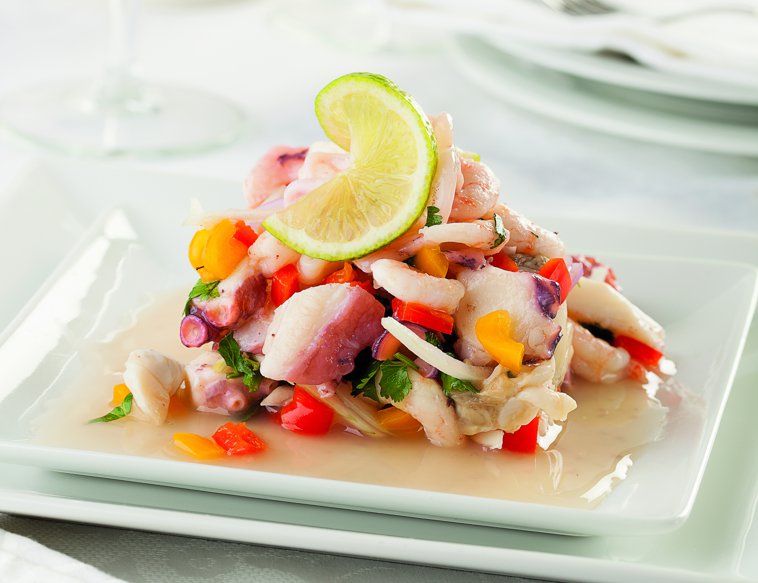Talk About Skills in Spanish
Vocabulary
Let's start off with the vocab words in these lessons!
| Spanish | English |
|---|---|
| la bicicleta | bicycle |
| el ceviche | ceviche |
| el flan | flan |
| la guitarra | guitar |
| el inglés | English (language) |
| el piano | piano |
| el taco | taco |
| examples |
|---|
Verbs
Here are all the verbs you learn in these lessons!
Caminar
Caminaris a regular -ar verb that means to walk.
| Pronoun(s) | Conjugation | Translation | Notes |
|---|---|---|---|
| yo | camino | I walk | |
| tú | caminas | you walk | informal singular you |
| vos | caminás | you walk | informal singular you (in parts of Latin America) |
| él, ella | camina | he, she walks | |
| usted | camina | you walk | formal singular you |
| nosotros, nosotras | caminamos | we walk | |
| vosotros, vosotras | camináis | you walk | informal plural you (in Spain) |
| ellos, ellas | caminan | they walk | |
| ustedes | caminan | you walk | plural you (in Latin America), formal plural you (in Spain) |
| examples |
|---|
Cantar
Cantaris a regular -ar verb that means to sing.
| Pronoun(s) | Conjugation | Translation | Notes |
|---|---|---|---|
| yo | canto | I sing | |
| tú | cantas | you sing | informal singular you |
| vos | cantás | you sing | informal singular you (in parts of Latin America) |
| él, ella | canta | he, she sings | |
| usted | canta | you sing | formal singular you |
| nosotros, nosotras | cantamos | we sing | |
| vosotros, vosotras | cantáis | you sing | informal plural you (in Spain) |
| ellos, ellas | cantan | they sing | |
| ustedes | cantan | you sing | plural you (in Latin America), formal plural you (in Spain) |
Contar
Contaris a stem-changing verb that means to count. Its "stem," co, changes to cue in all forms except for the vos, nosotros/nosotras, and vosotros/vosotras forms.
| Pronoun(s) | Conjugation | Translation | Notes |
|---|---|---|---|
| yo | cuento | I count | |
| tú | cuentas | you count | informal singular you |
| vos | contás | you count | informal singular you (in parts of Latin America) |
| él, ella | cuenta | he, she counts | |
| usted | cuenta | you count | formal singular you |
| nosotros, nosotras | contamos | we count | |
| vosotros, vosotras | contáis | you count | informal plural you (in Spain) |
| ellos, ellas | cuentan | they count | |
| ustedes | cuentan | you count | plural you (in Latin America), formal plural you (in Spain) |
Hablar
Hablaris a regular -ar verb that means to speak or to talk.
| Pronoun(s) | Conjugation | Translation | Notes |
|---|---|---|---|
| yo | hablo | I speak | |
| tú | hablas | you speak | informal singular you |
| vos | hablás | you speak | informal singular you (in parts of Latin America) |
| él, ella | habla | he, she speaks | |
| usted | habla | you speak | formal singular you |
| nosotros, nosotras | hablamos | we speak | |
| vosotros, vosotras | habláis | you speak | informal plural you (in Spain) |
| ellos, ellas | hablan | they speak | |
| ustedes | hablan | you speak | plural you (in Latin America), formal plural you (in Spain) |
Montar
Montaris a regular -ar verb that means to ride.
| Pronoun(s) | Conjugation | Translation | Notes |
|---|---|---|---|
| yo | monto | I ride | |
| tú | montas | you ride | informal singular you |
| vos | montás | you ride | informal singular you (in parts of Latin America) |
| él, ella | monta | he, she rides | |
| usted | monta | you ride | formal singular you |
| nosotros, nosotras | montamos | we ride | |
| vosotros, vosotras | montáis | you ride | informal plural you (in Spain) |
| ellos, ellas | montan | they ride | |
| ustedes | montan | you ride | plural you (in Latin America), formal plural you (in Spain) |
Preparar
Prepararis a regular -ar verb that means to prepare or to make.
| Pronoun(s) | Conjugation | Translation | Notes |
|---|---|---|---|
| yo | preparo | I prepare | |
| tú | preparas | you prepare | informal singular you |
| vos | preparás | you prepare | informal singular you (in parts of Latin America) |
| él, ella | prepara | he, she prepares | |
| usted | prepara | you prepare | formal singular you |
| nosotros, nosotras | preparamos | we prepare | |
| vosotros, vosotras | preparáis | you prepare | informal plural you (in Spain) |
| ellos, ellas | preparan | they prepare | |
| ustedes | preparan | you prepare | plural you (in Latin America), formal plural you (in Spain) |
| examples |
|---|
Saber
Saberis a regular -er verb except for the yo form, which is irregular. Saber means to know or to know how to and is used to talk about skills or general knowledge.
| Pronoun(s) | Conjugation | Translation | Notes |
|---|---|---|---|
| yo | sé | I know | |
| tú | sabes | you know | informal singular you |
| vos | sabés | you know | informal singular you (in parts of Latin America) |
| él, ella | sabe | he, she knows | |
| usted | sabe | you know | formal singular you |
| nosotros, nosotras | sabemos | we know | |
| vosotros, vosotras | sabéis | you know | informal plural you (in Spain) |
| ellos, ellas | saben | they know | |
| ustedes | saben | you know | plural you (in Latin America), formal plural you (in Spain) |
| examples |
|---|
Tocar
Tocaris a regular -ar verb that means to play when used with a musical instrument.
| Pronoun(s) | Conjugation | Translation | Notes |
|---|---|---|---|
| yo | toco | I play | |
| tú | tocas | you play | informal singular you |
| vos | tocás | you play | informal singular you (in parts of Latin America) |
| él, ella | toca | he, she plays | |
| usted | toca | you play | formal singular you |
| nosotros, nosotras | tocamos | we play | |
| vosotros, vosotras | tocáis | you play | informal plural you (in Spain) |
| ellos, ellas | tocan | they play | |
| ustedes | tocan | you play | plural you (in Latin America), formal plural you (in Spain) |
Two Ways to Play
You know two verbs that mean to play, but they're not used in the same contexts!
Jugar (to play) is used to talk about playing sports.
Tocar (to play) is used to talk about playing musical instruments.
Juego fútbol.(I play soccer.) Toco fútbol. Toco el piano.(I play the piano.) Juego el piano.Culture
In this lesson, you learn words for three delicious foods you'll find in the Spanish-speaking world: ceviche, flan, and tacos!
You're probably familiar with tacos, but you may not be as familiar with ceviche or flan. Let's take a look at the basics of these two yummy foods!
Ceviche
Ceviche is made with raw fish, shrimp, or other seafood that is normally marinated in lime or lemon juice with onions, peppers, and seasonings. Exactly how it's prepared can vary from place to place (and from chef to chef!), but it's a staple of coastal cities all over the Spanish-speaking world.

Flan
Flan, known as flan or crème caramel in English, is a custard dessert topped with caramel that is popular in Spain and Latin America.

Quiz Yourself!
Want more practice with the vocabulary you learned in these lessons? Click here!
Spanish Conversation
Fantastic! Let's put the grammar and vocab from above to the test in the following example of a conversation in Spanish.
Want to learn more? Check out the following articles!














